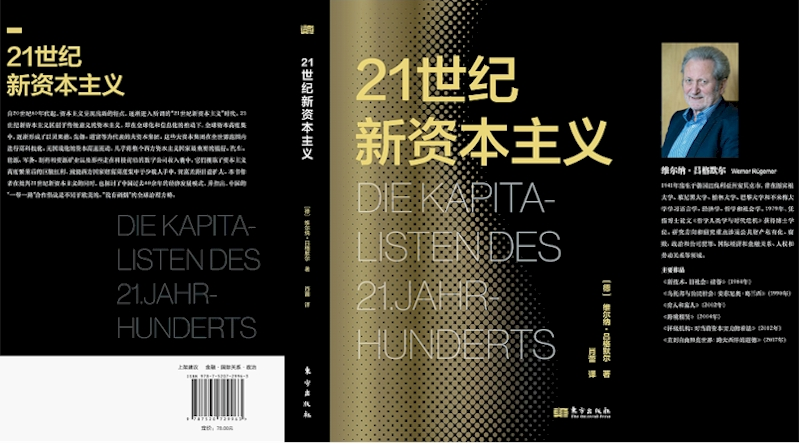
Imbalanced Global Expansion of 21st Century Capitalism and Outward Friendly Cooperation of China:
Book Review of Werner Rügemer’s “The New Capitalism in the 21st Century”
Under this title, a review of the Chinese edition of the book “The Capitalists of the 21st Century” appeared in the ‘Marxistische Blätter’ 5/6-2023. The author is Dr Werner Rügemer, member of the advisory board and executive committee of the German Freethinkers’ Association. It is a commonly understandable outline of the rise of the new financial players. We document this review in English and then in the Chinese original. Compiled by Klaus Hartmann, President of the World Union of Freethinkers.
Book review by Cheng Enfu / Yin Xing
First edition Cologne 2018, 3rd updated edition Cologne 2021.
Chinese edition published by Dongfang/Oriental Press, translated by Xiao Lei, Beijing 2023, 457 pages, 78 yuan, ISBN 978-7-5207-2996-3.
The book also appeared in English, French, Italian and Russian editions.
Since the global financial crisis in 2008, there have been two intertwined aspects in the United States. On one hand, there is the overt trend of anti-globalization, and on the other hand, there is the covert trend of continued global expansion of US financial capital. These two trends may appear contradictory but are internally interconnected. The major challenges brought about by the current unprecedented global changes seem to lie in the overt trend, but their internal contradictions lie in the covert trend. Understanding the inherent contradictions of the new global expansion of American financial capital in the 21st century and China’s friendly cooperation with other countries is crucial for better coping with these major global changes.
In his book “New Capitalism in the 21st Century” (The Chinese edition was published by The Oriental Press in June 2023, with ISBN 978-7-5207-2996-3. The Russian edition was published by Publishing House Nashe Zavtra in 2022, with ISBN 978-5-907585-22-5), renowned German scholar Werner Rügemer clearly points out that since the 1980s, driven by globalization and informatization, global capital has become highly concentrated, forming a few large capital groups that control the most important industries and companies in the West, gradually entering the era of “new capitalism in the 21st century.” The deep global expansion of new capitalism not only intensifies the concentration of wealth and power and imbalances in labor-capital relations, but also strengthens the economic and political control of the United States over Europe, leading to political crises, social crises, and global governance crises. China’s successful response to the challenges and opportunities brought about by globalization and its active promotion of rationalization of the global economic order have overcome the negative impacts of new capitalism, and countries around the world need to work together to promote cooperative development.
Firstly, this book conducts an in-depth analysis of the global deep expansion of transnational financial groups led by the United States, pointing out how they control crucial aspects of the economy through various mechanisms. The book categorizes financial participants into five tiers, and further provides a systematic empirical analysis of the collaboration within financial capital, financial capital’s control over digital capital, and the data monopoly of digital capital. It specifically reveals the logic behind financial capital, enhancing the targeted and credible critique of financial capital and digital capital, and dispels myths surrounding digital capital.
Secondly, this book takes the perspective of continental European countries to profoundly analyze how American financial capital strengthens its control over European capital. It examines how it replicates the labor-capital relations, media narratives, and data surveillance seen in the United States to suppress European local capital, diverting it towards the United States and enhancing America’s global capital dominance. This analysis contributes to dispelling the misconception of American „pseudo-multilateralism.“
Thirdly, from the viewpoint of Western left-wing scholars, this book presents a fair analysis and earnest expectations of how the People’s Republic of China responds to the challenges and opportunities of globalization and promotes global friendly cooperation. This work aids in fostering deep exchanges between Chinese and Western scholars regarding the achievements and international influence of the People’s Republic of China and helps break the isolation caused by the „Western values alliance“ towards China.
In terms of theoretical value, this book further dispels the myths surrounding the American free-market theory and democratic theory. It facilitates the expansion of new imperialism theory by advancing research on the new monopolies in production, circulation, financial capital, and international oligarchic alliances. It also promotes the study of the contemporary capitalist monopolistic, exploitative, decadent, parasitic, transitional, and precarious new trends.
In terms of practical value, this book helps deepen our understanding of the root causes and development trends of the current international relations crisis. It also provides strong insights and references for China’s enhanced regulation of financial capital and digital platforms. Given the covert nature of the combined infiltration of US financial capital and digital capital into the global economy under the wave of anti-globalization, China needs to not only open its doors wider but also maintain equal openness, better guide international capital, effectively safeguard the interests of its people, and promote the rationalization of the global economic order.
(Cheng Enfu is Chief Professor at University of Chinese Academy of Social Sciences and President of the World Association for Political Economy; Yin Xing is Associate Professor at Shanghai Maritime University and Ph.D. in Economics.)
___
21世纪新资本主义全球扩张失衡和中国对外友好合作
——评维尔纳·吕格默尔《21世纪新资本主义》
程恩富 尹兴
2008年全球金融危机以来,一方面是美国逆全球化的明线,另一方面是美国金融资本继续全球深度扩张的暗线,两条线相互交织,看似矛盾却内在契合。当前世界百年未有之大变局带来的重大考验看似在于明线,但其内在矛盾在于暗线。如何充分认识21世纪美国新型金融资本全球深度扩张的内在矛盾和中国对外友好合作,从而更好地应对大变局,是当前值得关注的重大现实问题。
德国知名学者维尔纳·吕格默尔先生著述的《21世纪新资本主义》(东方出版社2023年6月出版,肖蕾译)明确指出,从20世纪80年代起,在全球化和信息化的推动下,全球资本高度集中,形成了少数大资本集团,几乎控制了西方最重要的行业和公司,逐渐进入“21世纪新资本主义”时代。新资本主义在全球的深度扩张不仅加剧了财富权力的集中和劳资关系的失衡,也加强了美国对欧洲的经济政治控制,引发了全球金融和经济危机,进而催生了政治危机、社会危机和全球治理危机。中国特色社会主义成功应对了全球化带来的挑战机遇而迅速发展,并积极推动全球经济秩序的合理化。世界各国需要克服新资本主义的负面影响,共同推进合作发展。
首先,此书对美国为首的跨国金融集团的全球深度扩张进行了深入的机制分析,指出其如何层层控制了经济的关键部位。此书将金融参与者分为五个梯队,进而对金融资本内部的配合、金融资本对数字资本的控制、数字资本对数据的垄断等,提供了系统的实证分析,具体揭示了背后的金融资本逻辑,提升了对金融资本和数字资本批判的针对性和可信度,有助于打破数字资本的迷思。
第二,此书从欧洲大陆国家的视角,深刻剖析美国金融资本如何加强对欧洲资本的控制,如何复制美国的劳资关系、媒体舆论、数据监控,通过长臂管辖和国际冲突等打压欧洲本土资本,使其流向美国,增强美国全球资本中心地位,有助于打破美国“伪多边主义”的迷思。
第三,此书从西方左翼学者的视角,对中国特色社会主义如何应对全球化挑战和推动全球友好合作提出了比较中肯的分析和殷切的期待,有助于促进中西方学者对中国特色社会主义成就和国际影响的深度交流,有利于打破“西方价值观同盟”对中国的孤立。
从理论价值看,此书进一步打破了美国自由市场理论和民主理论的迷思,并有利于进一步拓展新帝国主义理论,如在新帝国主义的特征方面,推进对生产流通、金融资本、国际寡头同盟的新垄断的理论研究;在新帝国主义的性质方面,推进对当代资本主义垄断性和掠夺性、腐朽性和寄生性、过渡性和垂危性新态势的研究。
从实践价值看,此书有利于更加深入地理解当前国际关系的危机根源和发展态势,也对中国如何加强对金融资本和数字平台的监管,具有较强的启示和借鉴意义。由于逆全球化浪潮下美国金融资本和数字资本相结合渗透全球经济的暗流更具隐蔽性,中国在对外开放中既要坚持开放的大门越开越大,也要坚持对等开放,更好地引导国际资本,切实保障人民利益,推动全球经济秩序合理化。
(程恩富系中国社会科学院大学首席教授、世界政治经济学学会会长;尹兴系上海海事大学副教授、经济学博士)

